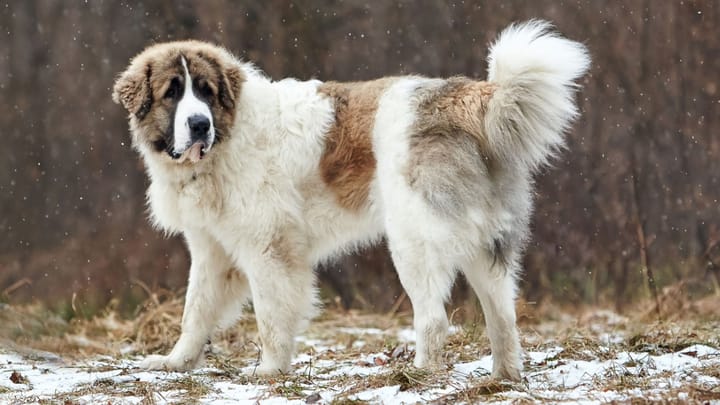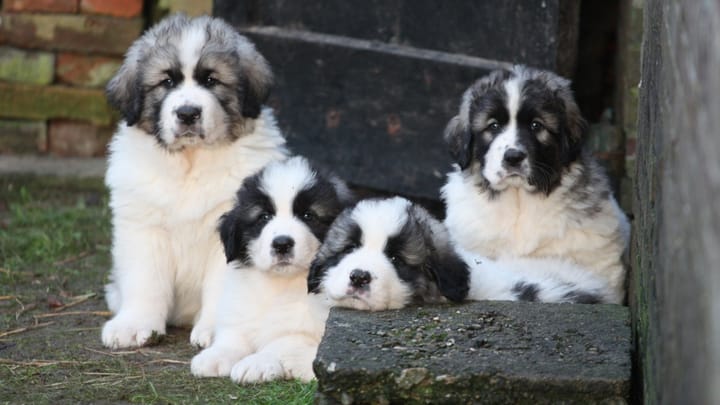Pyrenean Mastiff
Other name: Navarra Mastiff


The Pyrenean Mastiff is a large, imposing dog. Although they have huge, barrel-like frames, the Pyrenean Mastiff is very quick on its feet. These dogs are also completely fearless; they were first bred to protect livestock from wolves and beers. Despite their intimidating stature, the Pyrenean has a soft, loving, and even docile nature when it's not on guard duties. These gentle giants form really strong bonds with their owners and enjoy being around young children. Pyrenean Mastiffs don't require massive amounts of exercise, but they do need lots of space to feel comfortable.
|
Life expectancy |
The Pyrenean Mastiff has a life expectancy of between 12 and 14 years |
|
Temperament |
|
|
Size |
Large
|
|
Adult size |
Female
Between 28 and 30 in
Male
Between 30 and 31 in
|
|
Adult weight |
Female
Between 121 and 154 lb
Male
Between 121 and 154 lb
|
|
Coat colour
White or coloured coat with large dark markings, especially around the face and back. |
White |
|
Type of coat
The hair is mid-length. Thick, dense coat. |
Long |
|
Eye colour
Brown |
Brown
|
|
Purchase price |
The Pyrenean Mastiff costs between £0 and £700 |
The Pyrenean Mastiff is quite a rare breed in the UK. Potential owners will need to contact a specialist breeder and are likely to spend a few months on a waiting list.
These big dogs are big droolers. They can also be very “gassy.”
They're loyal and affectionate towards their families, but they can be suspicious of strangers.
The Pyrenean Mastiff is a brave and confident dog that is likely to confront a "stranger." The importance of socialisation can't be overstated when it comes to owning one of these powerful animals.
More details about the Pyrenean Mastiff
Pyrenean Mastiff: Origins and history
The Pyrenean Mastiff was developed in the Aragon and Castilla regions, which we now know as modern day Spain. These large, courageous dogs protected livestock and fought off bears and wolves in the process. Unsurprisingly, they became a popular choice for farmers and herders in and around the Pyrenean mountain ranges. They remained popular until the outbreak of the Spanish civil war. Given the hardships many people faced, the Pyrenean Mastiff was simply too expensive to take care off, and their numbers began to decline. Luckily for modern-day dogs lovers, a group of breeders started to re-establish the Mastiff during the 1970s. It was then recognised by the International Federation of Kennel Clubs (FCI) in 1982.
Physical characteristics of the Pyrenean Mastiff
A very large dog with a solid, muscular build. The Pyrenean Mastiff has a sizable head and a deep, broad chest. The hindquarters are exceptionally strong and sturdy. Their tails are set quite high and are very strong and flexible. Despite its appearance, the Pyrenean Mastiff is light and nimble on its feet, displaying the kind of agility and athleticism rarely seen in giant dog breeds.
FCI classification of the Pyrenean Mastiff
-
Group 2 - Pinscher and Schnauzer - Molossoid and Swiss Mountain and Cattledogs
-
Section 2 : Molossian type
Pyrenean Mastiff: Characteristics
Pyrenean Mastiff: Behaviour
Training a Pyrenean Mastiff
The inexperienced dog owner is likely to have a tough time training and socialising a Pyrenean Mastiff. Each dog has a unique set of needs, but training a giant working dog requires a very specific approach and experienced hand. Big dogs come with an even bigger responsibility. If you don't feel confident enough to handle them, then they're not the dog for you.
Pyrenean Mastiff: Lifestyle
Breed compatibility Pyrenean Mastiff
Pyrenean Mastiff: Purchase price
The average cost of a purebred Pyrenean Mastiff registered at the Kennel Club is approximately £700.
You'll also need to budget around £120 month for feeding costs.
Pyrenean Mastiff: Shedding
Heavy !
Shedding is important.
Pyrenean Mastiff: Grooming
Despite their thick, heavy coats, the Pyrenean Mastiff doesn’t require much grooming. You’ll need to give their coat a quick brush twice a week and they do tend to shed quite heavily during spring and autumn.
Pyrenean Mastiff: Health
The average lifespan for these dogs is between 8-10 years, although some can make it to 12 or 14.
These dogs are strong, robust, and very tough. Not only were they breed to survive inhospitable mountain conditions, but they would often protect the livestock by fighting off bears and wolves. And it doesn't get much tougher than that!
Its thick, dense coat means that the Pyrenean Mastiff is not suited to the warmer climates. So try to keep them out of the heat, especially when they're very young. Pyrenean puppies are full of energy and love to play; they can easily overheat if the temperatures soar.
These mountain dogs have no problem dealing with the cold. Like most other cattle and herding dogs, they have a thick double coat that insulates them from the worst weather conditions. If they can survive for hundreds of years in the mountains, they’ll have no trouble getting through the average British winter.
This dog is very greedy, you must be careful not to over feed him.
- Elbow Dysplasia
- Hip Dysplasia
- Cataracts
- Arthritis
- Bloat
- Glaucome
- Cataracts
- Hyperthyroidism




